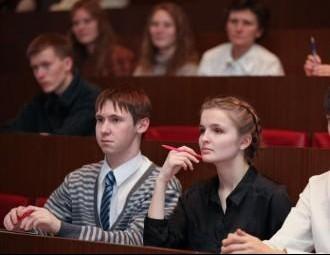Belarus has to change fundamental structure of education system

Availability, quality and cost are the main measures of education’s efficiency. While availability of education is enhancing in Belarus, its funding and quality are steadily descending.
This statement was made by Uladzimir Dunaeu, the member of the Public Bologna Committee, during the conference “Modernization of education: challenges and perspectives”, organized by the International Consortium EuroBelarus, Public Bologna Committee with the assistance of the Belarusian Language Society and the Office for the Rights of People with Disabilities.
- The statistics indicates that higher education is available, - Uladzimir Dunaeu explains. – This year the number of places in universities exceeded the number of high school graduates by almost 20 thousand places. But the fact that we have about 1 per cent of people with Master's degree compared to 15 per cent in developed countries speaks about the quality of education.
To improve the system of higher education we need to develop basic values that the education would be focused on, as well as to make its management public as much as possible, the expert believes. Thus, higher education institutions should have autonomous administration, financial, personnel management as well as academic autonomy. Judging by these criteria, Belarus lags behind most countries.
Public Bologna Committee suggests introducing changes to the legislation at all points of autonomy of the universities. Still, Uladzimir Dunaeu notes that Belarus has to change fundamental structure of education system, amending not only educational legislation, but also the laws that are related to it.
Tamara Matskevich: There is no place for discrimination in education
The participants of the conference noted that education should become available for everyone. Representatives of public organizations defended the interests of certain sections of the population.
Modern system of education basically deprives students and parents of the possibility to choose the language of studies, believes Tamara Matskevich, the representative of the Belarusian Language Society.
- Technically, Belarus has the right to choose the language of education; however, parents have to defend this right with great difficulties, - she explains. – About 50 per cent of the population recognize Belarusian language as their native, 23 per cent use it in conversations. For about 12 per cent of children in kindergartens and about 18 per cent of children in schools Belarusian language is a means of education. Often education institutions present parents with a fait accompli about the Russian language as a means of education without any discussion.
It is people with disabilities who feel discrimination most. Today there are 530 thousand disabled in the country; and only ten per cent of those are with a degree. The structure of higher education makes it unavailable for people with different limitations.
- We have to access the availability of higher education for the disabled by combining the measure of availability together with the barrier-free environment, - believes Siarhei Drazdouski, the coordinator of the "Office on the Rights of Persons with Disabilities". – Everyone has a right for available education. Regardless of the state policy in the sphere of education, it is the university that carries ultimate responsibility before the student with special needs. Thus, the universities have to be provided with the authority to solve the existing problems.
This year public organizations have worked out a number of amendments to the Code of Education. For now it is unknown which of them will be considered and adopted. However, experts note that the necessity of modernization of educational system is being under discussion among professionals from education.
- The experience of other countries is not enough to develop Belarusan education system, - summed up Uladzimir Matskevich, the head of the Board of the International Consortium “EuroBelarus”. – All innovations have to be adapted to the actual reality. Belarus should resolve present-day problems, not only seek after modernization.
-
03.01
-
07.10
-
22.09
-
17.08
-
12.08
-
30.09



























